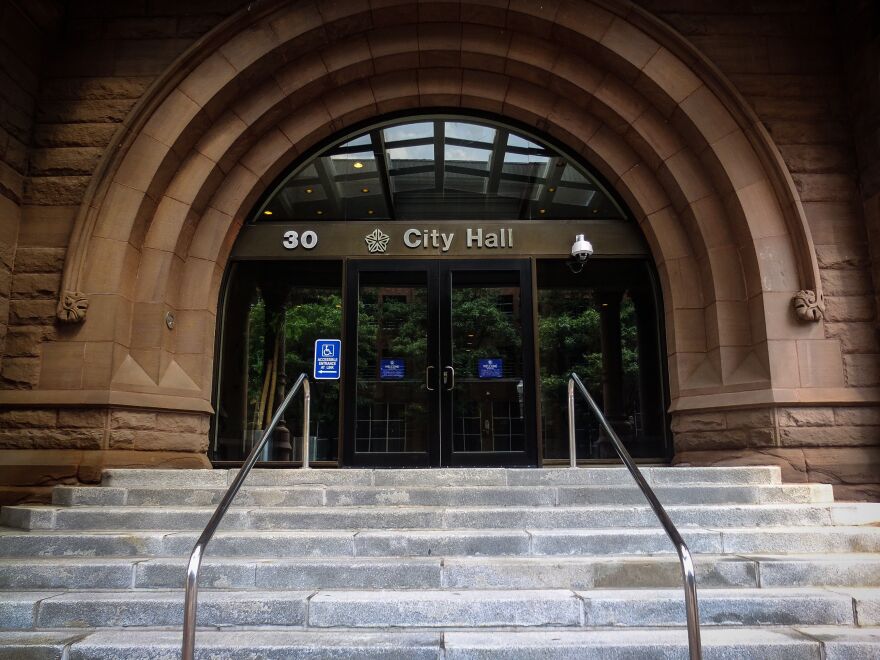Rochester City Council members voted down legislation Tuesday night that would have enacted new restrictions on evictions in the city by a vote of 3-6.
Prior to Tuesday’s vote, landlords publicly criticized the proposed Eviction Reduction Law while tenants and tenant advocacy groups rallied in favor of it — each contingent had dozens of speakers at the meeting.
The legislation also sparked lengthy debate among Councilmembers prior to the vote. Council Vice President Mary Lupien, one of the measure’s sponsors, likened the proposed law to supporting workers rights or ending slavery in the face of opposition.
“The consequences to our people, to our residents, have existed for some time,” Lupien said. “We can not be afraid to do what is right. In times past, Councils would have proposed something innovative, and their detractors would present uncertainty. They would have said that about slavery, what about the economic unintended consequences.”
The Eviction Reduction Law, which was also sponsored by Councilmembers Kim Smith and Stanley Martin, would have prohibited landlords without certificates of occupancy for the properties they own from evicting tenants. But the legislation contained a caveat on that prohibition — it would have allowed landlords to begin eviction cases if they could have proven that they were making a good-faith effort to get a C of O. Lupien previously gave the example of a tenant refusing the landlord access to the property as an example of the need for the provision.
The legislation also specified that tenants could be evicted for damaging property, turning the premises into a public nuisance, using the premises for illegal purposes, or violating at least one significant lease term. Landlords would also have been able to pursue eviction of tenants for other legal or health reasons, or when tenants repeatedly refuse their attempts to make repairs.
The Council members who opposed the legislation cited concerns about its legality. During a committee meeting last week, City Deputy Corporation Counsel Patrick Beath told Council members that the state constitution ultimately precluded Rochester from adopting the proposed law.
Albany passed a “good cause” eviction law and the city is current embroiled in a legal battle over it. Courts, however, have not placed an injunction on the law.
Councilmember Mitch Gruber, who voted against the proposal, accused the bill’s sponsors of engaging in “political theater.”
“I’m really disappointed my colleagues would put forward a bill that has no hope of being enforced,” Gruber said. “...We’re not making a righteous stand by passing legislation that can not be acted on. If it was passed tonight, it would do nothing but disappoint people.”
In a last-ditch effort to revise the bill, Smith brought forward a motion to table the legislation until April so that Council had more time to evaluate, discuss, and consider it. The motion failed 3-6, with Martin, and Lupien backing Smith.
“It is even more saddening that there has not been a counter proposal presented by anyone on Council who has a problem with this bill as it stands,” Martin said. “...You have the opportunity to do the right thing, and judging by the vote that came just before this moment, you will choose to do the wrong thing.”
All Councilmembers agreed that the city is facing sweeping issues around affordable housing as well as problem landlords. Even though Council President Miguel Melendez, voted against the proposed eviction law, he said it should be the utmost priority of the city to find long-term solutions to those issues.
“I think that we have seen urgency to prevent evictions, we’ve seen the pandemic-related rent supports,” Melendez said. “...All of these pieces, for me weigh heavy, and they should weigh heavy on all of us. In a city where the majority of our citizens are renters, we need to find a way to codify renters’ rights, and we need to be advocates for them.”
Gino Fanelli is a CITY staff writer. He can be reached at (585) 775-9692 or gino@rochester-citynews.com.



